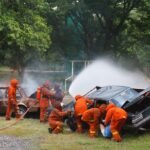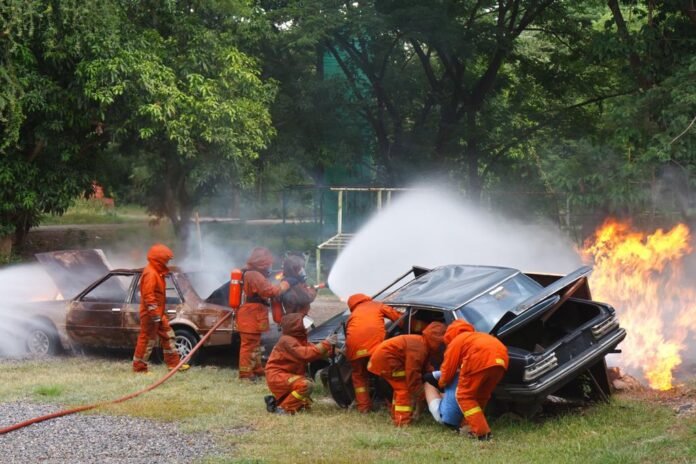By Josh Troy
Clarksdale AdvocateClarksdale
Clarksdale firefighters will soon have a new training facility that is being constructed next to the fire department on Sasse Street to help them face everyday situations.
Clarksdale Fire Department Training Chief Hunter Rybolt said firefighters would receive training on handling residential and store fires when individuals may be trapped inside.
“It’s just fire ground training,” Rybolt said. “It helps our new guys. It helps us as shifts, as companies can come in and formulate game plans to work on our everyday skills and work as a team. It’s teambuilding and individual skills, just fire ground related.”
Fire Chief Rocky Nabors said plans for the training facility have been in the works for approximately one year.
“Pretty much everything we see out in the field as far as fire fighting goes with search and rescue, we’ll be able to set up scenarios on that same level,” he said. “It’s getting prepared before we face what we have to face.”
Nabors said everything would be paid for through an insurance rebate, and the total cost should be an estimated $50,000.
Clarksdale firefighters constructed the training facility. The Coahoma County Road Department and the Clarksdale Public Works Department also volunteered their time and resources. “A big thank you to the County Board of Supervisors and Sheriff Charles Jones for allowing us to get stairs and railings out of the old county jail to add to the facility,” Nabors said. “A big thank you to County Road Administrator Otis Griffin and the county road department for assisting us with the removal and transporting of the material as well as setting up the containers. “
Local companies Willard Concrete Services and the Delta Farm Store assisted in the process and charged reduced rates.
Nabors estimated that if an outside company came in to build the training facility, it would cost an extra $100,000, bringing the cost total to $150,000.
Instead, Nabors said the project’s total cost would only be approximately $50,000.
Rybolt’s working hours with the fire department are 8 a.m. to 5 p.m. on weekdays. When he had different hours, he also was a contractor. His experience and skills played a significant role as the 38 fire department members came together in a collaborative effort to build the training facility.
“We have talented people in the department, but a lot of people have side jobs that are contractors and know welding,” he said. “Because, being a firefighter, you always have to have another job. A lot of times, they’re contractors.”
Nabors is pleased with the progress of the training facility and said there would be a groundbreaking after the work is completed.
“It’s almost like that piece of mind that we need as chiefs and administrators to know we’re just as sharp as anybody else when it comes down to facing an emergency and preparing ourselves for a travesty,” he said.
Nabors said the training facility would be accessible to firefighters in nearby areas such as Tallahatchie, Quitman, and Bolivar counties.
Rybolt estimated there are 300 firefighters within a 30-mile radius of Coahoma County.
“The benefit of us is we can kind of be a regional outlet for them to train,” Rybolt said.
Rybolt said some of the closer training facilities for firefighters are in Cleveland and Batesville.
Potential for better fire rating
The Mississippi Rating Bureau gives each fire department a rating classification at the end of each year.
The ratings are Class 1 to 10, with one being the best and ten being the worst.
Rybolt said the Clarksdale Fire Department was a Class 5 rating but recently improved to a Class 4. He said facilities are a factor in the ratings, and there are currently three fire stations on Lee Drive, Sasse Street, and DeSoto Avenue.
Rybolt said the fire department might improve to a Class 3 next year thanks to the addition of the training facility on Sasse Street. He added that a better rating could lead residents and business owners to save money on hazard insurance premiums.
“The facility helps the citizens’ and firefighters’ safety,” Rybolt said. “It helps us hone our skills so we can serve the citizens, but what it also does is, by having a training facility in place, Chief’s been working on a better rating classification.”
Rybolt said lower hazard insurance premiums could benefit the economic development of Clarksdale.
“Most of the time, they’re going to look at your schools,” he said. “They’re going to look at the crime, and they’re going to look at the taxes, and they’re going to look at the hazard insurance. The hazard insurance is what we can control as a fire department.”
Assistant Fire Chief Rodney Jackson said hazard insurance premiums on his home lowered as Clarksdale’s fire rating classification improved.
Rybolt acknowledged costs for homeowners and business owners might increase in other areas. However, he said a lower insurance premium could offset added expenses in other areas.
“We may not be saving a lot of people money, and they might not see a reduction, but we are offsetting rising insurance costs. We do know that for a fact.”
Other certifications
Rybolt said the fire department follows the National Fire Protection Association guidelines, and the goal is to make sure employees are certified in as many positions as possible.
“They set standards for people who hold positions for people who need certain certifications,” he said. “When we get out of the fire academy, we know state law says, hey, you have to be a trained firefighter.”
Rybolt said firefighters are taking courses to increase their certifications.
“Something we’ve recently moved in is everybody that holds a position, they become certified in those positions,” he said. “So, if you’re a driver, then you become a certified driver operator. If you become a company officer, then you become a certified company officer.” Rybolt said several firefighters are looking to go to Emergency Medical Technician school for additional certification.
He also said firefighters and managers could learn many skills on the job, but certification classes speed up the training because students are taught how to handle different situations.
“I say all of the time certifications don’t make you one, but it does lay a foundation,” Rybolt said. “So where it takes a lot of years of experience to start learning things, they can kind of get certification early on in those positions and then kind of go ahead and break some ice, and it gives them things to set a foundation.”





